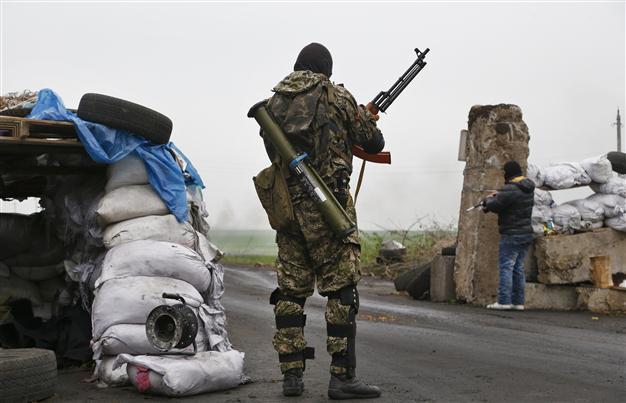New rebel violence in east Ukraine as 'helpless' Kiev looks on
DONETSK, Ukraine - Agence France-Presse

Pro Russian masked armed militants guard barricades near Slovyansk, eastern Ukraine, Wednesday, April 30, 2014. AP Photo
Pro-Russian militants Thursday unleashed fresh violence in restive east Ukraine, storming yet another public building and further fueling fears that the ex-Soviet republic could disintegrate.The violence in the city of Donetsk confirmed the separatists' expanding grip in Ukraine's east -- where they hold more than a dozen towns and cities, as Kiev admits it is powerless to halt their advance.
Germany meanwhile asked Russian President Vladimir Putin to help free an OSCE team of international inspectors held by rebels, while Kiev ordered a Russian diplomat out of the country for espionage.
The expulsion risked a tit-for-tat response from Moscow, where, in a show of patriotic fervour sweeping the country, 100,000 workers were parading on Red Square for the first time since the 1991 break-up of the Soviet Union.
The parade was technically in honour of International Labour Day -- but the banners declaring "Putin is right" and "Let's support the decisions of our president" made it more a victory march for the Russian leader and show of approval for his policies on Ukraine.
By contrast, the Labour Day march in Kiev -- whose government is backed by the West in the showdown with Moscow -- was dispirited, attended by a mere 2,000 people.
"Why do others quietly steal our land? Why does Russia do it, as well as the Ukrainian oligarchs? I am not against Russia, I don't care about what authority will be here, but they should give us a normal life," said one participant, a 51-year-old unemployed woman who gave her name as Zhanna.
In Donetsk, a pro-Russia rally degenerated into a savage attack against a public building defended by outnumbered riot police.
A mob of around 300 militants hurling rocks attacked the city's prosecutor's office, leaving at least four police officers wounded in the clashes with militants.
In Crimea, the Ukrainian peninsula Russia annexed in March, some 60,000 people marched in the main city of Simferopol to hail Putin bringing them under Moscow's governance, an AFP journalist saw. Putin and his prime minister, Dmitry Medvedev, are reportedly to make a triumphant visit to the territory late next week.
In the eastern Ukrainian town of Slavyansk, near Donetsk, a near week-long stalemate over the fate of seven detained European military inspectors with the Organisation for Security and Cooperation in Europe dragged on.
Rebels in the town have been saying for three days that the team, grabbed last week, were about to be freed after negotiations involving a prisoner swap.
But on Thursday, the militants instead said they had exchanged two of three Ukrainian commandos captured separately for some of their colleagues taken prisoner by Kiev, according to the Interfax news agency.
There was no immediate confirmation from Ukrainian authorities, and the condition of all three of the men was unknown. The last time they were seen, on Russian state television, they were savagely beaten, cuffed to chairs with their bloodied eyes bound by tape, and stripped to their underwear.
In her phone call to Putin, Germany's Merkel asked for help to have the European OSCE members released.
"The chancellor reminded President Putin of Russia's responsibilities as an OSCE member and called on him to use his influence," Merkel's spokesman said.
The Kremlin said both leaders emphasised the "mediating potential of the OSCE" in calming the crisis in Ukraine.
Putin reiterated his call for Kiev to end its military operation trying to halt the pro-Russian rebels grabbing more towns.
The West believes Putin is pulling the strings in the insurgency, dismissing his denials that Russian forces are covertly leading rebel assaults.
This week, the US, the EU, Japan and Canada imposed sanctions on powerful Russian individuals and firms as punishment for what is seen as continuing interference by Moscow.
Russia has reacted angrily, but said it would not retaliate in kind at this time.
Moscow "will not rush to do anything stupid," Russian Foreign Minister Sergei Lavrov said on a trip to Latin America. But he threatened action if the West upped the pressure.
The International Monetary Fund has meanwhile thrown a $17-billion lifeline to Ukraine, with $3.2 billion of that available immediately. That money could be used to pay $3.5 billion Russian gas debt that Putin has warned could lead to him turning off the taps in a move also affecting several European countries.
Talks were due to take place Friday in Warsaw between the European Union, Russia and Kiev over the gas dispute.
While Kiev may have staved off bankruptcy, it has found itself unable to roll back the rebels in the east.
On Wednesday, acting president Oleksandr Turchynov said the country's military was on "full combat alert" against a possible invasion by tens of thousands of Russian troops camped on the border. He also ordered a pre-dawn military parade in Kiev that produced just 10 armoured vehicles and several armed soldiers.
But there was no sign of increased military activity in the east, where the main operational focus was manning a roadblock perimeter at a distance around Slavyansk. The interior ministry said that between 30 and 50 of its law enforcement officers were being held in the town.
The rebels in the east have vowed to hold a "referendum" on independence on May 11 -- two weeks before a nationwide presidential vote is due to take place on May 25.
The unrest in Ukraine, which started with peaceful demonstrations in Kiev against former president Viktor Yanukovych, has rapidly spiralled into one of the worst geopolitical crises in years.
After a deadly crackdown on protesters, Yanukovych was forced out, sparking fury in Moscow which ended in the Kremlin's blitz annexation of Crimea.
















